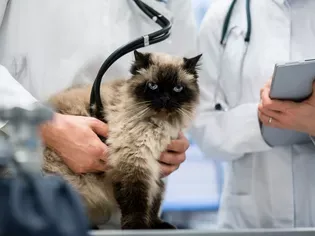Encephalitis in Cats
Updated on 05/26/24

Encephalitis in Cats: A Comprehensive Guide to Symptoms, Causes, and Treatment
Introduction
Encephalitis, an inflammation of the brain, is a serious neurological condition that can affect cats of all ages. While it is relatively rare, encephalitis can have devastating consequences if left untreated. This comprehensive guide will delve into the complexities of encephalitis in cats, providing pet owners with crucial information about its causes, symptoms, and treatment options.
What Is Encephalitis?
Encephalitis refers to inflammation of the brain tissue. In cats, this inflammation can be caused by a variety of factors, including viral infections, bacterial infections, parasitic infestations, and even certain medications.
Causes of Encephalitis in Cats
* Viral Infections: Feline herpesvirus-1 (FHV-1), feline calicivirus (FCV), and feline panleukopenia virus (FPV) are the most common viral causes of encephalitis in cats.
* Bacterial Infections: Bacteria such as Streptococcus, Staphylococcus, and Escherichia coli can also cause encephalitis in cats.
* Parasitic Infestations: Parasites like Toxoplasma gondii, Neospora caninum, and Acanthamoeba can lead to encephalitis in cats.
* Medications: Certain medications, such as corticosteroids and certain antibiotics, can have rare but severe side effects that include encephalitis.
Symptoms of Encephalitis in Cats
The symptoms of encephalitis in cats can vary depending on the severity of the inflammation and the area of the brain affected. Common symptoms include:
* Neurological Signs: Seizures, tremors, difficulty walking, head tilt, and altered mental status (e.g., lethargy, aggression, disorientation)
* Ocular Signs: Squinting, dilated pupils, nystagmus (rapid eye movements)
* Behavioral Changes: Aggression, fearfulness, and excessive vocalization
* Gastrointestinal Signs: Vomiting, diarrhea, and loss of appetite
Diagnosis of Encephalitis
Diagnosing encephalitis in cats can be challenging due to its non-specific symptoms. Your veterinarian will perform a thorough physical examination and neurological assessment, including:
* Blood Tests: To rule out other medical conditions and assess organ function
* Imaging Tests: MRI or CT scans to visualize the brain and identify any inflammation or structural abnormalities
* Cerebrospinal Fluid Analysis: To test the fluid that surrounds the brain and spinal cord for signs of inflammation and infection
Treatment of Encephalitis in Cats
Treatment for encephalitis in cats depends on the underlying cause. If a specific infection is identified, antibiotics, antiviral medications, or anti-parasitic medications may be prescribed.
* Anti-inflammatory Medications: Steroids or other anti-inflammatory drugs can help reduce swelling and inflammation in the brain.
* Seizure Control: Anticonvulsant medications may be necessary to control seizures.
* Supportive Care: Providing proper nutrition, hydration, and a comfortable environment is crucial for cats recovering from encephalitis.
Prognosis for Encephalitis in Cats
The prognosis for cats with encephalitis depends on the severity of the inflammation, the underlying cause, and the response to treatment. With prompt diagnosis and appropriate care, many cats can recover fully or with minimal long-term neurological deficits. However, some cats may experience permanent neurological damage or even death.
Prevention of Encephalitis in Cats
While not all cases of encephalitis in cats can be prevented, vaccination can protect against some of the most common viral causes, such as FHV-1, FCV, and FPV. Additionally, good hygiene practices, including regular flea and parasite control, can help reduce the risk of exposure to infectious agents.
Conclusion
Encephalitis in cats is a serious but treatable condition that requires prompt veterinary attention. By recognizing the signs and symptoms, understanding the potential causes, and being aware of the treatment options and prognosis, pet owners can provide the best possible care for their feline companions affected by this condition.
Explore More Pets

Cat Behavior Problems
How to Stop Aggression in Kittens

Long-Haired Cat Breeds
Siberian Cat: Breed Profile, Characteristics, & Care

Cat Behavior Problems
How to Stop Kittens From Scratching and Biting

Long-Haired Cat Breeds
Turkish Angora: Cat Breed Profile, Characteristics & Care

Basic Training
How to Socialize Your Kitten

Short-Haired Cat Breeds
Cute Pictures & Facts About Calico Cats & Kittens

Litter Box Training
Training Your Kitten to Use the Litter Box

Long-Haired Cat Breeds
10 Fun Facts About White Cats
